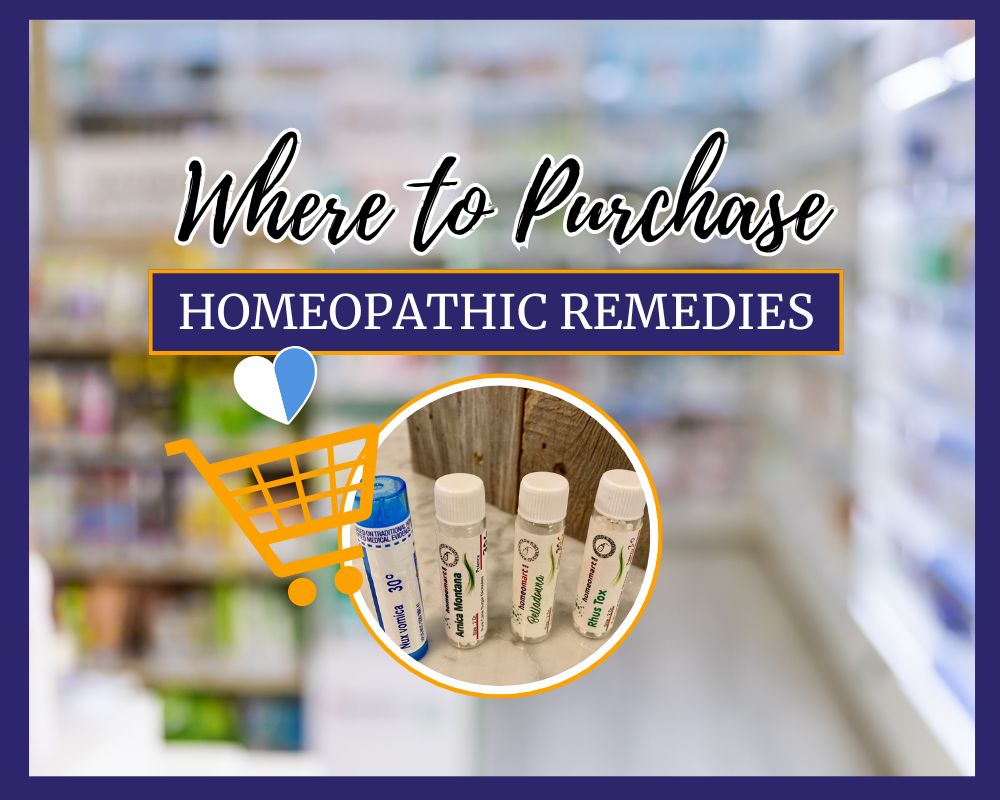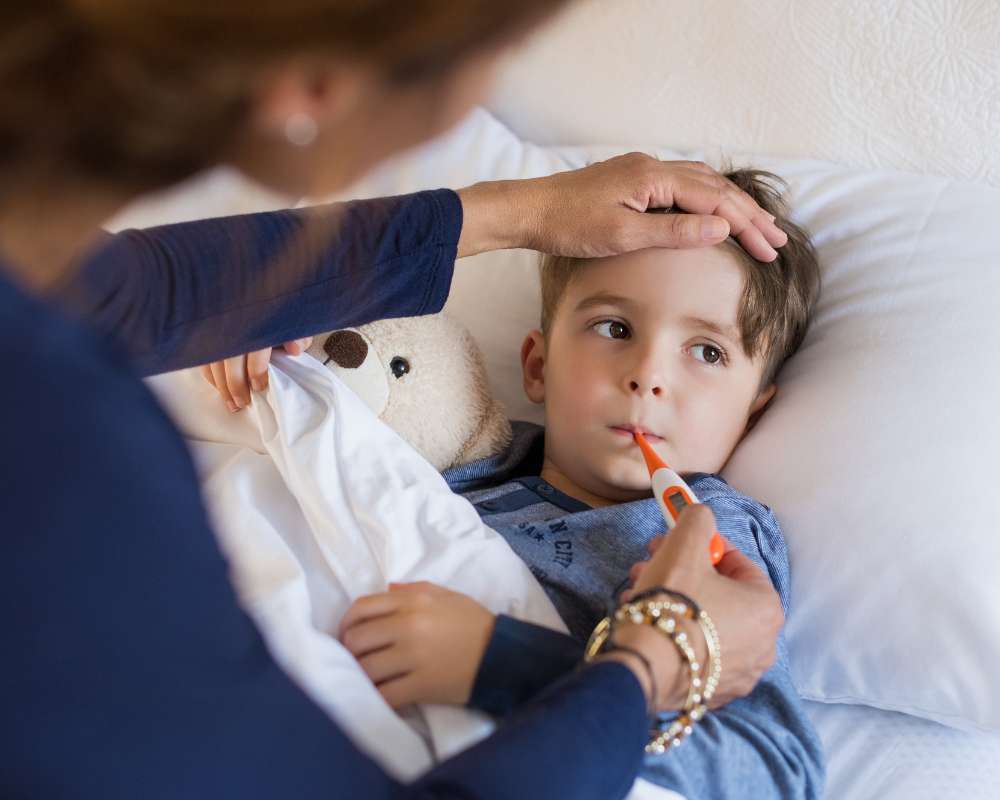As parents, we want the best for our children, especially when they’re sick. It’s tempting to reach for Tylenol (acetaminophen) or other pain relievers to help them feel better fast. However, it’s crucial to understand that what seems like a quick fix might have serious side effects. Let’s delve into 5 compelling reasons to reconsider giving your child Tylenol for fever and pain relief.
P.S.- I’m looking at you, too, Genexa, Dye-Free Tylenol, Little Remedies, NyQuil, and other acetaminophen products! Brand name doesn’t matter here.
(This article is for educational purposes, and it is not medical advice. Seek medical help from a healthcare provider whenever it makes sense to do so. This post may contain Amazon affiliate links.)
1. Fever Is Not the Enemy, but Tylenol Might Be
When your child develops a fever, it’s a sign that their immune system is actively fighting off an infection. Administering Tylenol to lower a fever can interfere with this process.
Research indicates that fever plays a vital role in enhancing the body’s immune response. For instance, a study published in Pediatric Annals emphasizes that fever is an essential component of a functioning immune system. They stress that parents should be educated to reject “fever-phobia” and understand that medications are for the purpose of comfort, not to “fight” the fever. The article also clearly states that fever is not the enemy and comes with benefits.
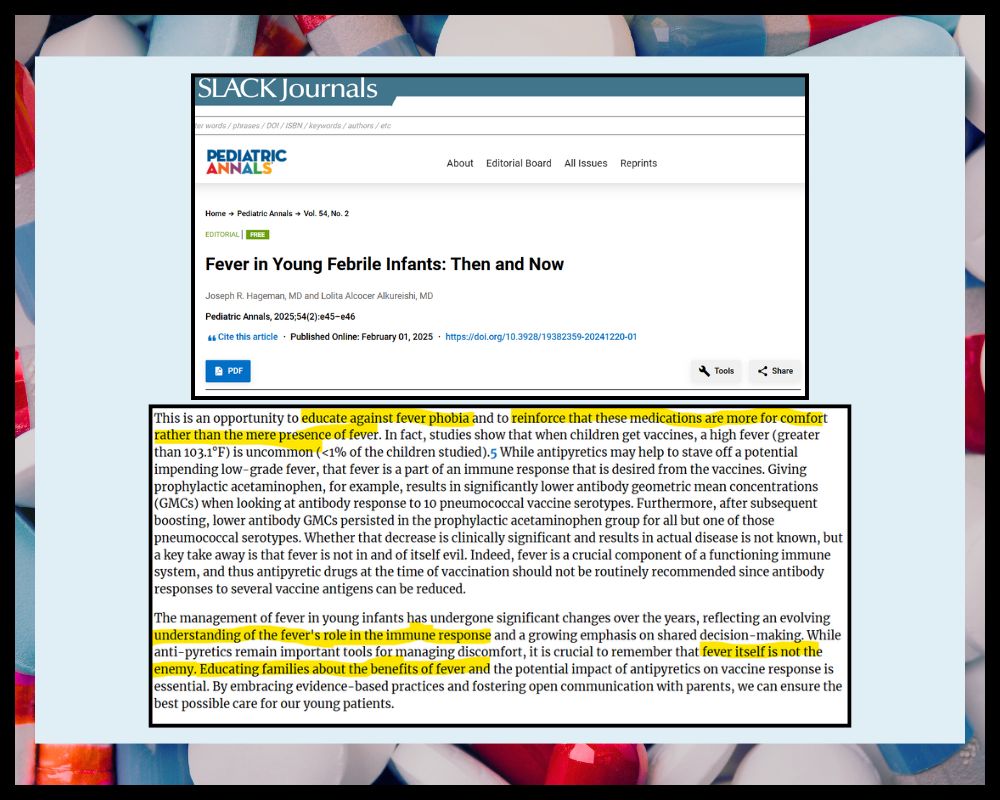
Furthermore, in his book How to Raise a Healthy Child in Spite of Your Doctor, pediatrician Dr. Robert Mendelsohn states, “If your child contracts an infection, the fever that accompanies it is a blessing, not a curse. It occurs because of the spontaneous release of pyrogens that cause the body temperature to rise. This is a natural defense mechanism that our bodies employ to fight disease. The presence of fever tells you that the repair mechanisms of the body have gone into high gear (page 80).”

In this article from Research and Reviews in Pediatrics, they stress that fever is simply a symptom, not the problem. They further explain that, with a few rare exceptions like hyperthermia, fever is not harmful. They mention the protective role it plays in our bodies by firing up the immune system. I also found it interesting that they mention 106 degrees as the temperature that should cause concern, which happens to be the same number mentioned in Dr. Mendhelson’s book above.
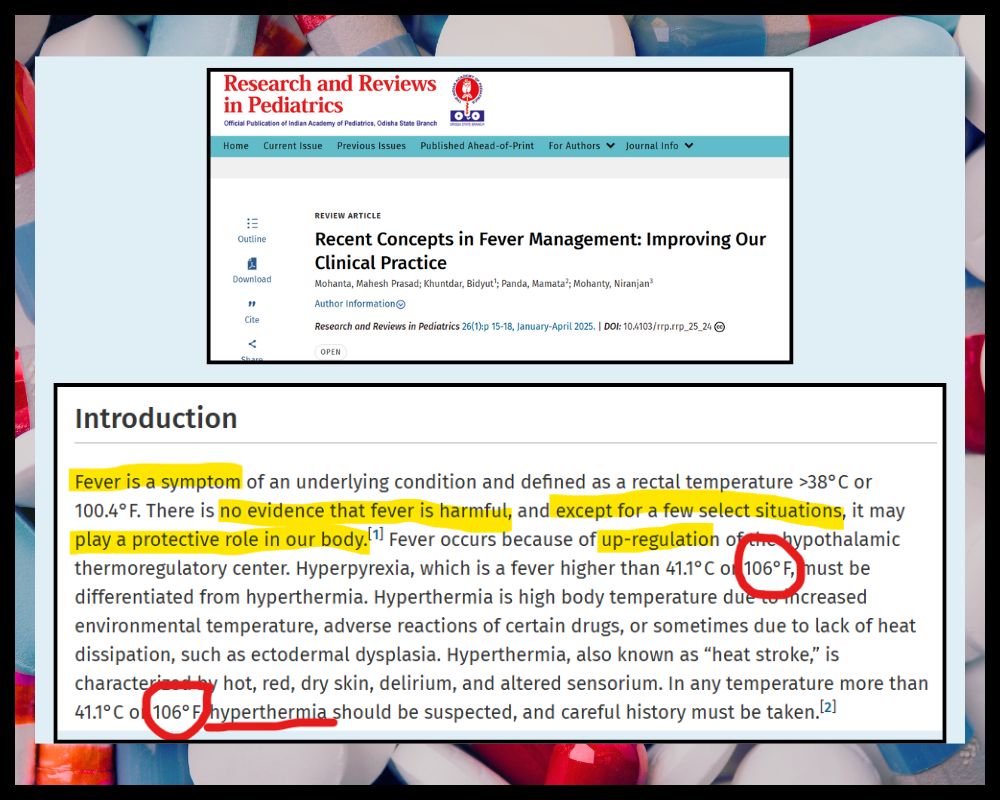
By suppressing a fever with Tylenol, you might be hindering your child’s body’s ability to combat the infection effectively. Instead of masking the fever, I always choose to focus on keeping my child comfortable and monitor his/her symptoms closely. How, you ask? Homeopathy is a great choice! For example, if sore throats accompany the fever, I might give the homeopathic remedy Mer Sol (see Merc Sol on Amazon here). If muscle aches are the chief complaint associated with the fever, I might offer the homeopathic remedy Eupatorium Perf (see Eupatorium Perf on Amazon here). In this way, I’m not simply using a fever reducer to bring down the temperature. Instead, I’m using homeopathy to encourage the body to address the root cause of the issue.
If you’re not sure where to start with homeopathy, I have some helpful videos for beginners and even the top 10 remedies every family should own. It is also a good idea to own a homeopathy kit. You can find my recommendations here.
2. Tylenol Depletes Glutathione
Glutathione is an important antioxidant in the body (source). It helps protect cells from oxidative stress caused by free radicals, which can damage DNA, proteins, and lipids. Glutathione is also important for detoxification. It helps to neutralize and eliminate toxins, heavy metals, and drugs from the body through the liver. It also supports immune function and helps regulate inflammation. Bottom line: Glutathione is very important! But studies show (1, 2, 3) that Tylenol depletes glutathione, therefore negatively impacting our overall health.

It is important to note that these studies found that glutathione depletion happens no matter how much Tylenol is taken. Because the body absorbs the Tylenol into the small intestine then metabolizes it in the liver, even the recommended dose of acetaminophen must be processed using glutathione reserves. This is why people who have had liver transplantation are often advised to use extreme caution with Tylenol or avoid it completely.
3. Tylenol is Associated with Asthma, Eczema, and Allergic Conditions

Several studies have found a dose-dependent association between acetaminophen use and an increased risk of developing asthma, eczema, and other allergic conditions. For instance, a study involving over 18,000 participants in Poland reported that frequent use of acetaminophen was linked to a higher prevalence of asthma symptoms, allergic rhinitis, and atopic eczema across all age groups .

Similarly, research in Spain indicated that adolescents who used acetaminophen in the past month had a significantly higher risk of developing atopic eczema, especially when combined with other allergic conditions like asthma or rhinitis.

A comprehensive review and meta-analysis of 13 cross-sectional studies, 4 cohort studies, and 2 case-control studies involving over 425,000 participants found that acetaminophen use was associated with an increased risk of asthma and wheezing in both children and adults. Notably, the risk was higher in children who used acetaminophen in the year prior to asthma diagnosis and within the first year of life. Additionally, prenatal use of acetaminophen was linked to an increased risk of asthma and wheezing in children.
4. Tylenol is Associated with Neurodevelopment Issues
Recent studies have found associations between Tylenol and neurodevelopment issues.

A meta-analysis involving over 73,000 mother-child pairs found that prenatal acetaminophen exposure was associated with a 19% increased likelihood of Autism Spectrum Disorder (ASD) symptoms and a 21% increase in Attention-Deficit/Hyperactivity Disorder (ADHD) symptoms in older children aged 4–12. These associations were slightly stronger in boys.

A study from the Illinois Kids Development Study reported that acetaminophen use during pregnancy, particularly in the second and third trimesters, was linked to speech delays and smaller vocabularies in children at age 3, with boys being particularly affected.
Yet pregnant women are still told Tylenol is the safest option. It is important to note that the participants in these studies took “safe dosages”, not overdoses.
5. Accidental Tylenol Overdose Can Be Deadly
It may not seem like a real threat, but taking an accidental overdose of Tylenol happens more than you think. Parents may “stack” over-the-counter medication without realizing that these medications already contain Tylenol, thus giving too much acetaminophen and causing unintentional overdoses. For example, NyQuil, Robitussin, and other cold medications all contain acetaminophen. If parents give multiple doses of these medicines throughout the day plus the recommended dosage of Tylenol, it could be problematic.

A published journal article title “Estimates of Acetaminophen (Paracetomal)-Associated Overdoses in the United States” points out the high frequency of annual overdoes. It states, “Analysis of national databases show that acetaminophen-associated overdoses account for about 56,000 emergency room visits and 26,000 hospitalizations yearly. Analysis of national mortality files shows 458 deaths occur each year from acetaminophen-associated overdoses.”

Looking at the American Association of Poison Control Center’s reports, you’ll get a better understanding of acetaminophen toxicity. In the 2022 report, acetaminophen poisoning was responsible for 46,337 single-substance exposure calls. In fact, acetaminophen is usually in the top 5 most common poisonings.
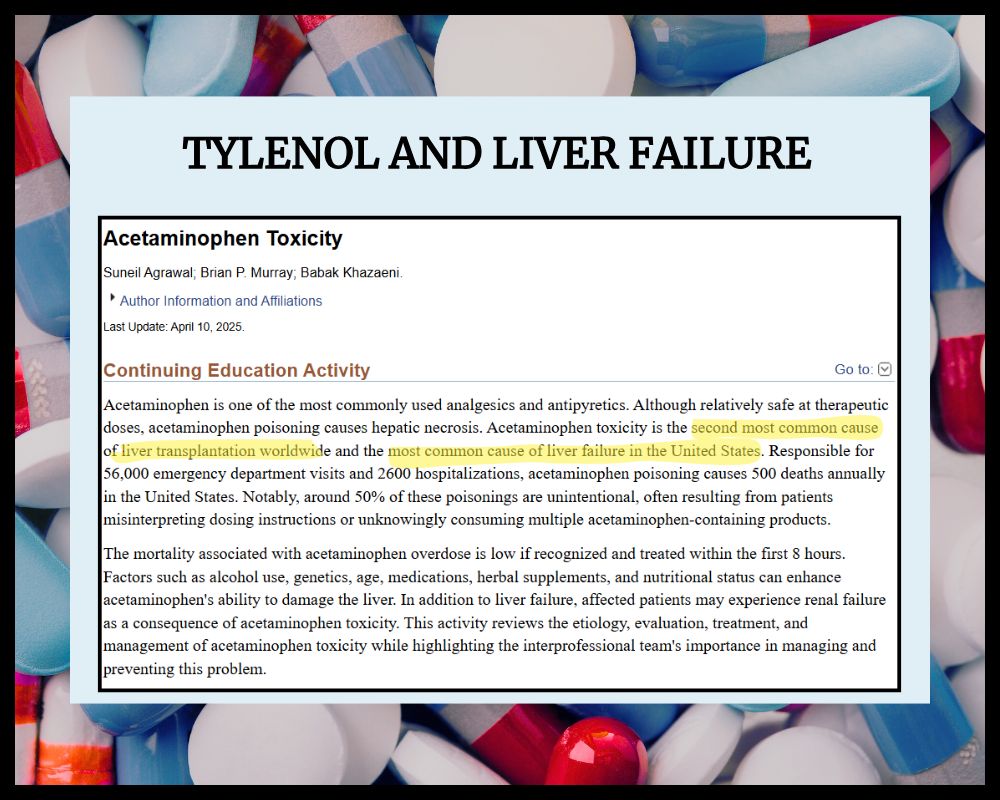
Tylenol is the leading cause of acute liver failure in the U.S. (source) and the 2nd leading causing for needing a liver transplant in the U.S.
Final Thoughts on Tylenol
Tylenol is one of the most common medications, and you can find it in most any grocery store, dollar store, or drug store. Doctors say it is generally considered safe. However, a closer look at some research leaves us asking, are these doctors looking at the available information or just repeating a well-versed paradigm? Does it actually make our kids better, stronger, healthier? Or is it doing harm when when we are trying to help?
While there may be rare cases where the benefits of Tylenol outweigh the risks and downsides, should it the first thing we reach for in our medicine cabinets? Not at my house. In fact, we haven’t had a bottle of Tylenol in our home for a long time…years and years to be exact. Why? Because it doesn’t make sense to let it sit on the shelf and expire for the few-and-far-between times we MIGHT need it. In those handful of times, since it is an over-the-counter medicine, my family could grab some quickly.
I encourage you to carefully consider your Tylenol use, just like you consider your prescription drugs. And whenever you buy conventional cold medicines or pain medications for your family, be very aware of the amount of acetaminophen used in the drug. Better yet, equip yourself with other, safer options so that you can take care of your family without drugs when the need arises. You can find my recommendations for stocking your natural medicine cabinet here. Stay diligent, friends!
Note: This article is for informational purposes only and does not constitute medical advice. Always consult with a healthcare professional before making decisions regarding your child’s health.



